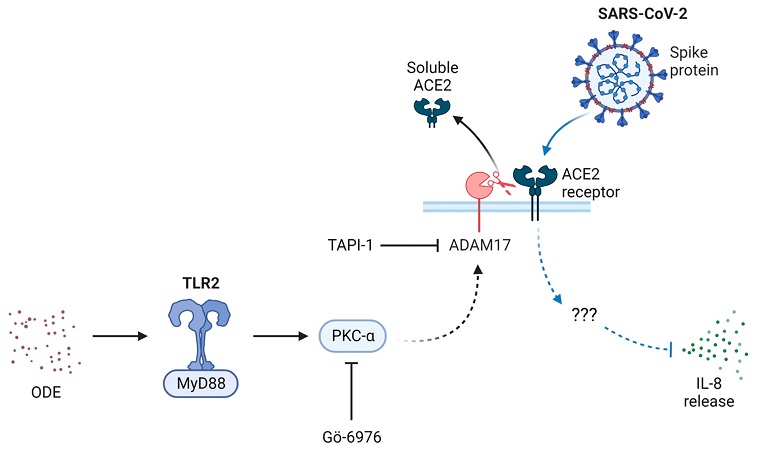Nikhil Prasad Fact checked by:Thailand Medical News Team Jul 20, 2024 9 months, 6 days, 5 hours, 14 minutes ago
COVID-19 News: Researchers from the University of Nebraska Medical Center-USA have made a groundbreaking discovery: inhaling organic dust can make it easier for the COVID-19 virus to enter the lungs. This
COVID-19 News report delves into their fascinating findings and the implications for those working in agriculture.
 Proposed mechanism through which agricultural dust exposure could affect SARS-CoV-2 entry in vitro. Organic dust exposure (ODE) activates Toll-like receptor 2 (TLR2) and MyD88, which then activates protein kinase C alpha (PKCα). Through intermediates, PKCα activates ADAM-17 which cleaves the ACE2 receptor on the cell membrane producing soluble ACE2. PKCα can be inhibited by the addition of Gö 6976 and ADAM-17 can be inhibited by the addition of TAPI-1. If membrane ACE2 is intact, upon SARS-CoV-2 infection, the viral spike protein can bind the receptor and through unknown intermediates diminish IL-8 release in vitro.
The Connection Between Dust and COVID-19
Proposed mechanism through which agricultural dust exposure could affect SARS-CoV-2 entry in vitro. Organic dust exposure (ODE) activates Toll-like receptor 2 (TLR2) and MyD88, which then activates protein kinase C alpha (PKCα). Through intermediates, PKCα activates ADAM-17 which cleaves the ACE2 receptor on the cell membrane producing soluble ACE2. PKCα can be inhibited by the addition of Gö 6976 and ADAM-17 can be inhibited by the addition of TAPI-1. If membrane ACE2 is intact, upon SARS-CoV-2 infection, the viral spike protein can bind the receptor and through unknown intermediates diminish IL-8 release in vitro.
The Connection Between Dust and COVID-19
Agricultural workers are frequently exposed to organic dust, particularly those working in swine confinement facilities. This dust comprises bacteria, fungal spores, and other particulates that cause inflammation in the lungs. According to the researchers, exposure to this organic dust significantly increases the levels of a crucial receptor, ACE2, in the lungs. This receptor is what the SARS-CoV-2 virus uses to enter human cells.
This study, conducted by Dr Abenaya Muralidharan, Dr Christopher D. Bauer, Dr Claire G. Nissen, Dr St Patrick Reid, Dr Jill A. Poole, and Dr Todd A. Wyatt, explores how organic dust exposure enhances the virus's ability to infect the lungs through mechanisms involving specific proteins, namely PKCα and ADAM-17.
Key Findings from the Study
The researchers carried out experiments on both mice and human bronchial epithelial cells to understand the impact of organic dust on SARS-CoV-2 infection. Here's what they found:
-Increased ACE2 Levels in Mice: Mice exposed to organic dust showed a significant increase in ACE2 levels in their lungs. The dust seemed to activate a protein called ADAM-17, which facilitates the release of ACE2 from cell membranes.
-Higher Viral Entry: Mice repeatedly exposed to organic dust and then infected with a SARS-CoV-2 pseudovirus had higher levels of the virus in their lungs compared to those not exposed to the dust. This suggests that organic dust exposure can make the lungs more susceptible to COVID-19 infection.
-PKCα Activity in Human Cells: In human bronchial epithelial cells, organic dust increased the activity of PKCα, another protein involved in the body's response to infection. The study showed that inhibiting PKCα and ADAM-17 led to i
ncreased ACE2 levels on cell surfaces, making it easier for the virus to enter the cells.
-Impact on Inflammatory Response: The infection with SARS-CoV-2 pseudovirus reduced the secretion of IL-8, an inflammatory molecule, in cells treated with organic dust. This decrease was observed regardless of the presence of PKCα or ADAM-17 inhibitors, suggesting a complex interaction between the virus and the body's immune response.
Implications for Agricultural Workers
The study's findings have significant implications for agricultural workers, particularly those exposed to organic dust from swine facilities. These workers are already at a higher risk of developing chronic lung diseases due to their exposure to dust. The increased susceptibility to COVID-19 adds another layer of risk, emphasizing the need for better protective measures in these environments.
Future Directions
The researchers highlighted the need for further studies to fully understand the mechanisms by which organic dust exposure enhances SARS-CoV-2 infection. They also pointed out the potential for developing targeted interventions to reduce the risk for those exposed to organic dust regularly.
Conclusion
This groundbreaking study sheds light on the intricate ways in which environmental factors like organic dust can influence the severity of COVID-19 infections. The findings underscore the importance of occupational health and safety, particularly in agriculture, to protect workers from heightened risks during the pandemic.
The study findings were published in the peer-reviewed International Journal of Translational Medicine.
https://www.mdpi.com/2673-8937/4/3/32
For the latest
COVID-19 News, keep on logging to Thailand Medical News.
Read Also:
https://www.thailandmedical.news/news/u-s-study-shows-that-exposure-to-air-pollutants-can-exacerbate-the-effects-of-a-covid-19-infection
https://www.thailandmedical.news/news/breaking-highly-pathogenic-avian-influenza-viruses-such-as-h5n1-are-also-wind-borne-and-can-be-transmitted-over-distances-of-up-to-25-km
